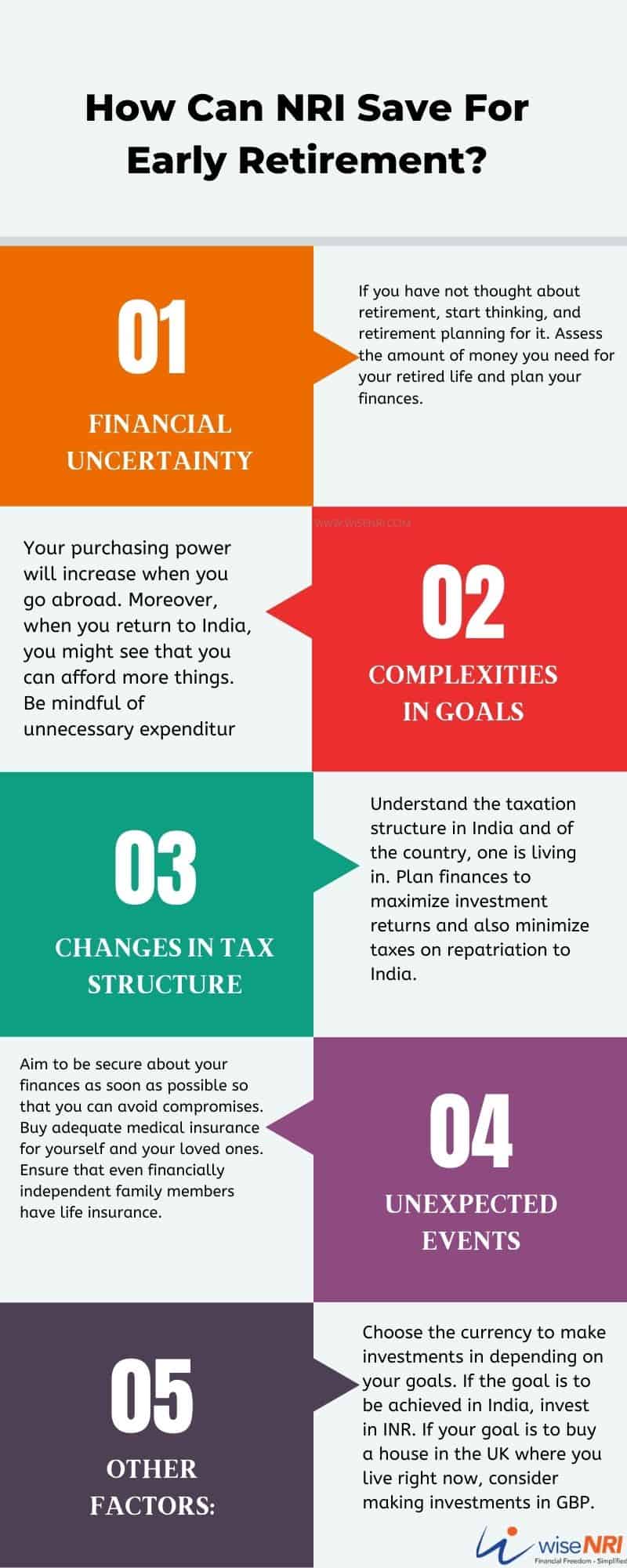As an NRI, you must have definitely pondered over these questions –
When am I going to retire?
Where am I going to retire?
Do I have enough money to retire?

Must Check- How Much Retirement Corpus Is Enough
This week I asked for suggestions from readers regarding the topics that are relevant & helpful for NRIs. I got almost 200 emails with multiple suggestions. I really thank all of you from the bottom of my heart. 🙂
This post is based on a suggestion – an NRI from the Middle East shared…
“I am a regular reader of your NRI articles and its quite interesting. But I always felt you never touched the base factor of the NRI.
One of the major issues NRI face concerning the Investment is the inconsistency of the time frame an NRI will be an NRI and secondly the Job Security every NRI faces from the day he/she lands in a foreign land or Middle East seeking employment. So its quite difficult to plan a steady investment for growth because NRI’s always have a big emergency fund than savings fund, since for an NRI everything is emergency. Moreover, the families living in India has no clue on the hardships of the NRI and they spend the hard earned money remitted by the NRI for their daily needs or even to meet their needs and wants beyond the bear necessities. This way NRI’s savings are drained leaving him with literally no buffer corpus nor he has any long term investment nor he has any retirement savings.Could you provide an insight as to how to manage investment time in relationship with the NRI job security. None of the NRI’s who seek employment has any clue or plans as to how long he/she is going to remain in a steady employment, secondly none of the NRI are sure if he/she will be having a consistent payroll and thirdly none of the NRI is sure if his payslip will be having the same figures all the time, and fourthly, NRI’s are not sure if the salary would be in their Salary account every month on same day.”
If you ask me a simple answer – I will suggest Change the equation of your Financial Life
Current: Income – Expenses = Savings
New: Income – Savings = Expenses
I know it’s not easy but start now.

Read – Planning For retirement in India – 5 Easy Steps
How Can NRI Save For Early Retirement?
It may not be possible to predict the perfect retired life. But a good retirement plan that considers an early retirement can empower you to face curveballs that life throws at you.
One of the factors that NRIs have to consider while planning their finance is an early retirement India because of many reasons –
Financial Uncertainty:
The world has been moving towards localization and nationalism. Jobs are being reserved for locals. There are restrictions on work for foreigners. With COVID-19, there has been a bigger impact on people working abroad. There is a great deal of financial uncertainty all across the world.
NRIs will have to consider these factors while planning their personal finances. They are at risk of being downsized at work. They might not get another job either due to economic reasons or political reasons. Your career might be shorter than you expected or you are on a longer break than you wanted. It, therefore, makes sense to plan for retirement well in advance and also assume that retirement is closer than what you anticipated.
How To Manage Financial Uncertainty
If you have not thought about retirement, start thinking, and retirement planning for it. Assess the amount of money you need for your retired life and plan your finances. Think of your retirement goals. Save as much as possible by reducing your expenses as much as possible. Invest in a variety of assets such that you get optimum returns.
Rajiv, a 32-year-old marketing manager did not want to work in an office cubicle till the age of 60. He decided to retire by the age of 45. He calculated the amount he would need and focused on having positive cash flow and a well-diversified investment portfolio. He would regularly review his investments to tune it to his personal situation and market conditions.
Must Check – How can NRI retire early using the FIRE Method?
Complexities in Goals:
When you are an NRI, you have conflicting goals of enhancing your lifestyle and saving money. You are not sure whether your children will study in India or abroad. You might be on a contract or project which does not have a fixed timeline. You may be abroad on a visa or work permit tied to the company. It means you cannot switch jobs or even look for another one easily when you are laid off. You will not be able to decide on many aspects of life leading to complexities in your goals.
How To Manage Complexities in Goals
Your purchasing power will increase when you go abroad. Moreover, when you return to India, you might see that you can afford more things. Be mindful of unnecessary expenditure. Your corpus has to outlive you and to achieve that you have to:
- Calculate the retirement corpus required.
- Invest in assets that can beat inflation.
- Think of sources of income post-retirement. If you are fit, capable, and inclined to work, you can seek jobs that are suited to your needs. Sneha, a CA worked in the finance department of an FMCG company. After she had taken voluntary retirement, she started working on ad hoc projects in a boutique financial firm. She kept herself occupied and at the same time had the flexibility and earned money.

Read – Best Investment options in India
Changes in Tax Structure:
Every year, the tax net gets tighter on NRIs. Even in this year’s budget, there were many changes. Many investment options are not available to NRIs. It is not easy for an NRI to plan his finances. There can be changes in the tax structure in the future as well. They might be in favor of NRIs or against them. Taxation affects the investment portfolio and saving capacity.
NRIs should plan for early retirement so that the portfolio is cushioned from the negative effects of taxation policies. NRIs have to bear in mind the taxation policies of the country they are currently living in.
How To Manage Taxation
Understand the taxation structure in India and of the country, one is living in. Plan finances to maximize investment returns and also minimize taxes on repatriation to India.
Unexpected Events:
Unexpected events like disability, critical illness, death of a loved one can derail finances. They may bring on premature retirement.
How To Manage Unexpected Events
Aim to be secure about your finances as soon as possible so that you can avoid compromises. Buy adequate medical insurance for yourself and your loved ones. Ensure that even financially independent family members have life insurance. Build an ideal investment portfolio early on, that will suit your investment ability, risk profile, and retirement goals. Engage with a financial advisor if required.
“People want to travel, start ventures, or experience new things. You can make the most of all this when you are in good health which means an early retirement and a good corpus.” wiseNRI
Check – Pension Plan For NRI in India – Dream Retirement
Other Factors:
There is no social security in old age. Families are becoming nuclear now and that means reduced dependence on children. Life expectancy is on the rise in India. People also want to make the most of their life. They want to do more than just relax in the easy chair on the balcony or spend time with grandchildren. People want to travel, start ventures, or experience new things. You can make the most of all this when you are in good health which means an early retirement and a good corpus.
How to Manage Other Factors
Choose the currency to make investments in depending on your goals. If the goal is to be achieved in India, invest in INR. If your goal is to buy a house in the UK where you live right now, consider making investments in GBP.
Anticipate an NRI early retirement and start financial planning early. Save soon, save more. Invest your savings and bonuses in instruments that beat inflation.
My grandfather worked in the same bank for more than 30 years. But today with geopolitical shifts, automation, outsourcing, localization, etc. long-term job security is a myth. It will be in our best interest to prepare for early retirement. Transform your financial habits and develop a financial plan that will provide you with financial security.
“Financial matters are complex, more so if you are an NRI. But managing them is not impossible.”
Let’s work on your Financial Plan
If you have any questions related to NRIs Save For Early Retirement or financial planning – please add them in the comment section.

What does nri stand for?
Nri should keep all funds in FCNR . as most of other products for Nri are not guaranteed returns. when calculating rupee deprivation you loose value than gain.
Don’t trust any of foreign Banks there are charges on closure of FCNR even on maturity.
Hi Sunil,
Thanks for sharing your views but my suggestion is it’s important to have diversification.
Dear Sir,
I am an NRI for the past 30 years and planning to retire in Mar 2021.I hold a joint NRE account with my wife and she is house wife.After retiring I would like to split the amount held in NRE account and make separate resident savings accounts for me and my wife to park the funds to invest independantly and file returns separately.Am I allowed to do this?
Regards,
Kumar
Dear Kumar,
If she had some earnings when you people were outside India – you can do that. Else clubbing provision will apply in India.